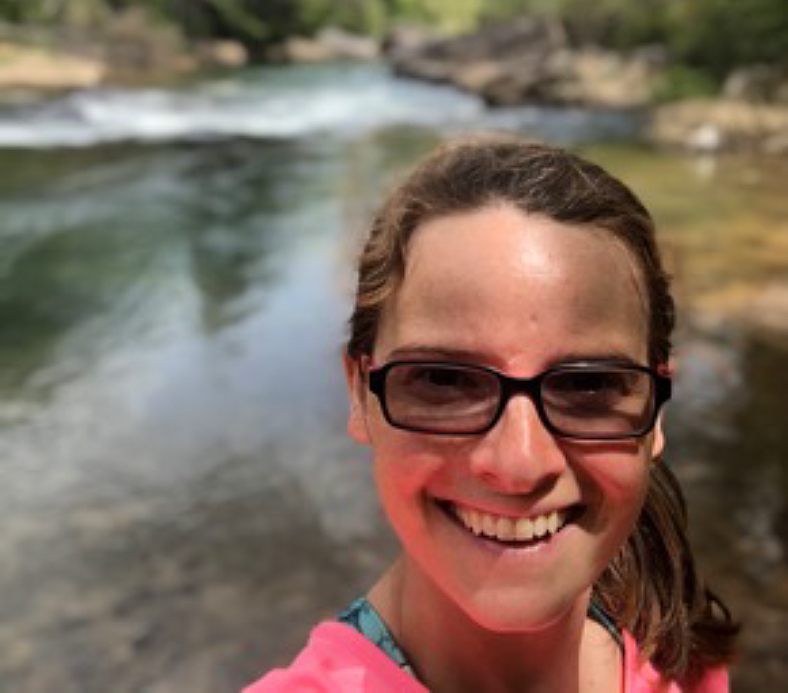 Brandi Gaertner joined the department this summer as an assistant teaching professor of spatial data science in the online geospatial education program.
Brandi Gaertner joined the department this summer as an assistant teaching professor of spatial data science in the online geospatial education program.
She earned her doctorate in forestry and natural resources from West Virginia University.
Gaertner is a climate change hydrologist, GIS analyst, and is also working on a master’s degree in instructional design and online technology.
“Climate change hydrology is the study of changing temperature regimes on surface water availability,” Gaertner said. “In response to climate change, some regions—like West Virginia and Pennsylvania—are becoming wetter while others—such as the southeast U.S.—are becoming drier.”
Gaertner said she was inspired to bring together the disciplines of climate change hydrology and GIS while she was conducting fieldwork for her first master’s degree.
Her recently published research looked at changes in growing season length and freshwater availability, focusing on the West Virginia Appalachian Mountains region.
“West Virginia is one of the most heavily forested states in the country, which acts as a natural filtration system and can help stabilize water supplies,” Gaertner said.
“Due to its location along the spine of the Appalachian Mountains, it is the headwater catchment for many different large river systems including the Potomac, Monongahela, and Mississippi, and provides upward of 30 percent of its clean and stable water supplies to downstream communities in Washington D.C., Pittsburgh, Ohio, and communities further downstream the Mississippi River.”
In a 2019 study on how climate change is affecting the region’s growing season, Gaertner used both satellite and historical data on spring bloom dates to calculate the change in the growing season. She found that a longer growing season has implications for water supply and biodiversity.
“Because trees use water in the process of evapotranspiration, a longer growing season could lead to reduced surface water, which could lead to reduced water availability for domestic water supply, industry, or agriculture,” Gaertner said. “Secondly, as the trees begin to bloom and temperatures rise earlier in the spring, insects respond by eating and pupating earlier. However, birds migrate on a biological clock and may miss this important meal supply on their migration north in the spring, which could lead to reduced avian biodiversity.”
In a 2020 study following up on climate change implication for freshwater availability, Gaertner found that both increased flooding in some areas and increased drought in other areas were likely to become more common, presenting challenges for water management.
“Climate change is currently a very contentious issue, but everyone notices water, especially natural disasters such as floods and droughts,” Gaertner said. “Individual citizens recognize the importance of having water available for drinking and agriculture. By showing the impact of climate change on surface water hydrology, my studies can help water and climate change managers, while also appealing to the citizens to recognize current national and global water concerns.”
As a teacher, Gaertner said she wanted to learn more about how to develop effective online courses so she could provide more flexibility for her students, so she enrolled in a master’s program in online technology and instructional design after earning her doctorate.
“I consider myself a lifelong student and enjoy the opportunity to continue to develop my professional craft,” she said, adding that being an adult online learner herself helps her to be a more effective instructor.
Gaertner will be teaching GEOG 484 GIS Database Development, GEOG 487 Environmental Applications of GIS, and GEOG 583 Geospatial System Analysis and Design this academic year.
“My training in instructional design has impacted my teaching in many ways including online feedback and communication, online technology, course development and design, and teaching philosophies,” Gaertner said. “I like to use scaffolded course design and project-based learning which allows the students to develop their own project, choose their own data, or adjust the course to their interests or learning styles.”
Gaertner said she is looking forward to working with students to continue growing-season research in different ecosystems.
After she completes her master’s degree in online technology and instructional design in spring 2022, Gaertner said she plans to continue to pursue a master’s degree in lifelong learning and adult education and diversity studies certificate through Penn State World Campus.
“Since so many of the students in the GIS program are adult learners, it’s important to understand how to communicate, motivate, and mentor students from underrepresented groups,” she said.

